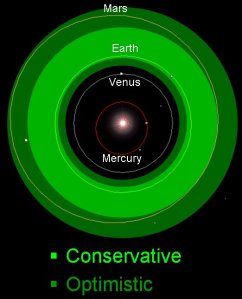Knowing when one is going to die is a frightening idea. I am sure very few people want to know their date of death. Predicting when a human or any other animal will die is impossible, unless you trust fortune tellers. Recently a more trustworthy group, tye scientists at the UEA’s school of Environmental Sciences, have been working on predicting when we all will die and they discovered when. That is, they formulated an accurate estimate as to when Earth will not be habitable.

Conservative and optimistic estimates of our solar system’s habitable zone.
http://www.astronomy.ohio-state.edu/~pogge/Ast161/Unit7/life.html
According to their research, in 1.75 to 3.25 billion years, the Earth will no longer be in our solar system’s habitable zone. We will exit the habitable zone because as our Sun evolves it becomes larger and as it grows larger it becomes brighter. Brightness and solar temperature are inextricably linked, therefore the Sun will heat up as it grows bigger and brighter.Increasing solar temperatures, will force the habitable zone to grow wider and migrate farther from the Sun. Fortunately, and unfortunately, Earth orbits the Sun in an ellipse fixed at 1.5×108 kilometers from the Sun’s core. Our enduring orbit, has provided Earth with stable conditions conducive to life for the last four billion years. Unfortunately, we cannot follow the habitable zone’s outward migration and the implications of being outside the habitable zone are quite severe.

The Sun will eventually become a red giant. Consequently it will be larger, brighter and hotter.
http://www.physics.uc.edu/~hanson/ASTRO/LECTURENOTES/W07/Evolution/Page4.html
Once outside, the intensity of the Sun’s heat will initiate a runaway greenhouse effect. Higher temperatures will cause liquid water on Earth’s surface to evaporate and travel high into the atmosphere. At such altitudes, UV radiation, unblocked by the ozone layer below, will destroy water vapor, leaving only hydrogen and oxygen molecules. The hydrogen molecules will zip off into space as they easily reach Earth’s escape velocity. Without sufficient amounts of hydrogen, Earth will lack the ingredients to create water. As water vapor is destroyed in the upper atmosphere, liquid water on Earth’s surface will continue to evaporate into the lower atmosphere. To compound the situation, evaporated water vapor in the lower atmosphere will contribute significantly to the warming because it is a greenhouse gas. The subsequent hotter temperatures will allow the atmosphere to hold more water vapor. As a result, more surface water evaporates and a destructive positive feedback loop sets in that will heat Earth’s surface and bake its crust far past the point of habitability.
Earth’s future is bleak. At least, we know when this will happen and that is not for a very long time. Us, humans will long be extinct, suffocated in the aftermath of a large asteroid impact or felled by our own internal conflicts. But, we could somehow survive long enough for ‘leaving the habitable zone’ to be a daily concern, and by then hopefully we will have colonized Mars. Thus, we could perpetuate our existence a few more billion years. Eventually, Mars will not be in the habitable zone, so we would have to move again, and again when the Sun explodes, and again when the exoplanet we have conquered becomes inhabitable and again when that star explodes, and again, and again, and again. Then we will have returned to our migratory beginnings, as hunters and gatherers, except on galactic scale.
Sources
“Earth’s Habitable Lifetime.” Astrobiology Web. N.p., 20 Sept. 2013. Web. 10 Oct. 2013. <http://astrobiology.com/2013/09/earths-habitable-lifetime.html>.
